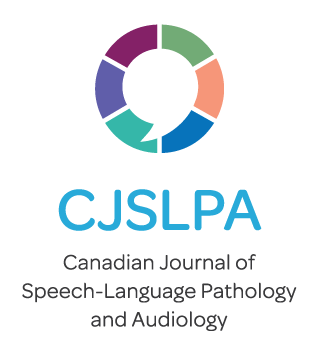

| Author(s) |
Natacha Trudeau Ève Chaput Ann Sutton Elsa Chan Resi Contardo |
| Volume | 30 |
| Number | 3 |
| Year | 2006 |
| Page(s) | 158-168 |
| Language | French |
| Category | |
| Keywords |
Augmentative and alternative communication voice synthesizer intelligibility appreciation |
| Abstract |
Les synthèses vocales en français se multiplient et sont plus fréquemment recommandées aux personnes ne pouvant communiquer par la parole naturelle. Les intervenants disposent de très peu de données objectives pour les guider au moment de sélectionner une synthèse vocale pour un client francophone. Cette étude a pour but de mesurer l’intelligibilité de sept voix (six synthèses vocales françaises et une voix naturelle numérisée), et d’évaluer l’appréciation subjective que des locuteurs du français en ont. Vingt-cinq participants ont été répartis en deux groupes sur la base de leur expérience antérieure avec des appareils de communication avec sortie vocale (15 novices et 10 initiés). Leur tâche consistait à écrire des mots produits par les différentes voix dans deux conditions (Mots isolés et Mots produits à la fin d’un énoncé) et de donner une appréciation subjective de la voix entendue. Au niveau de l’intelligibilité, le degré d’expérience avec les synthèses vocales n’a pas affecté la performance des participants. De façon générale, l’intelligibilité varie d’une voix à l’autre et la présence d’un contexte linguistique facilite significativement la reconnaissance des mots. De plus, une interaction entre le contexte linguistique et la voix permet de constater que la présence d’un énoncé porteur facilite la reconnaissance de mots de façon différente selon la voix, ramenant l’intelligibilité de trois synthèses vocales au même niveau que celle de la voix naturelle numérisée. Au niveau de l’appréciation, les participants ont indiqué des préférences, peu importe leur degré de familiarité avec les synthèses vocales. De plus, bien qu’une relation s’observe entre l’intelligibilité et l’appréciation, les résultats montrent qu’à intelligibilité égale, l’appréciation subjective varie, confirmant l’importance de prendre en considération les deux types de variables lors d’une recommandation en clinique. French voice synthesizers are now more common and more frequently recommended for individuals who are unable to communicate through natural speech, but clinicians lack objective data to guide them in the choice of a voice synthesizer for a French-speaking client. The purpose of this study was to measure the intelligibility of seven voices (six French synthesized voices and a digitized natural voice), and to assess the subjective ratings that speakers of French gave to these voices. Twenty-five participants were divided in two groups on the basis of their past experience with voice output communication aids (15 novice and 10 familiar). The participants were asked to write words produced by the various voices under two conditions (words alone and words produced at the end of a sentence). In addition, when a word was produced at the end of a sentence, the participants were asked to give a subjective rating of the voice. Results showed that the degree of previous exposure to voice output communication aids did not affect the performance of the participants. General trends revealed that some voices were more intelligible than others, and that the presence of a linguistic context significantly facilitated the recognition of the words. Moreover, an interaction between the linguistic context and voice revealed that the impact of the linguistic context is different between the voices, increasing the intelligibility of some synthesized voices to the same level as that of the digitized voice. Participants also demonstrated preferences for certain voices. Moreover, although a link between intelligibility and subjective ratings was observed, results showed that among voices with similar intelligibility levels, subjective preferences were still present, confirming the importance of taking into account the two types of variables when making a recommendation. |
| Record ID | 929 |
| Link | https://cjslpa.ca/files/2006_JSLPA_Vol_30/No_03_153-208/Trudeau_Chaput_Sutton_et_al_JSLPA_2006.pdf |
CJSLPA is an open access journal which means that all articles are available on the Internet to all users immediately upon publication. Users are allowed to read, download, copy, distribute, print, search, or link to the full texts of the articles, or use them for any other lawful purpose.
CJSLPA does not charge authors publication or processing fees.
Copyright of the Canadian Journal of Speech-Language Pathology and Audiology is held by Speech-Language and Audiology Canada (SAC). Appropriate credit must be given (SAC, publication name, article title, volume number, issue number and page number[s]) but not in any way that suggests SAC endorses you or your use of the work. You may not use this work for commercial purposes. You may not alter, transform, or build upon this work.